Translated into English by Aimee Van Vliet.
The end of fighting in Corsica left my grandpa and his men in limbo, immobile and abandoned, in a delirious purgatory of hunger and memories of the violence they had just experienced.
I have often wondered what must have been going through his mind during those weeks without future between 1943 and 1944, while Italy was falling apart. And even now, having had a small taste of isolation and uncertainty, I still have no idea how he must have felt. In spite of my renewed attempts to understand him, his life experiences and my own are like parallel lines, destined never to cross.
The only real immobility I have experienced, albeit in a comfortable, privileged setting, came with the arrival of the novel coronavirus. Closing the door, hanging up my days at the entrance and letting time flow over me has been a new experience, one I never imagined I would have. The walls of my house have become my new horizon, while the pace my work sets is a precious link to the outside world.
Of course, the restrictions on movement introduced in Belgium, where I live, cannot be compared to those in Italy, where I am from. In Brussels it has always remained possible to go for a walk, with no limits on the distance travelled from home. A drive to the supermarket or to work, if you could still go, required no certificate. I have to admit that I have felt a certain sense of excitement during those moments: driving through the empty city streets in the cocoon of my car with the radio turned up, I felt a shiver run down my spine and down into my legs. It was a small act of rebellion against the situation I found myself in. And returning to movement filled me with a taste of freedom.
At the beginning of the lockdown, though, I was afraid. Afraid of getting sick, of not being able to travel to Italy to see my family, of losing a loved one. Then, as always, reality kicked in. Slowly, the days returned to normal, drawn out in a new sort of circularity, rolling into one, their outlines blurred. In this space, ripped from the lost routine, far from the people I shared my life with and who formed its balance, I took a long look behind me. And the love of the many people I have met along the way, whatever its conclusion, filled my mind, bringing me unexpected feelings of peace. My time on earth, I thought, was not for nothing.
I wonder if my grandpa, who at the time was younger than I am now and caught up in significantly more difficult circumstances, found similar comfort inside himself while waiting to return to Italy and an uncertain future.
I have thought about this a lot recently, especially as my first contact with a crowd was with him, outside of the safe boundaries of home and school. Given the current circumstances, it seems like an unrepeatable experience.
It was the 21st June 1990. I was 9 years old, and my grandpa had decided to take me to the opening match of the Italia 90 football World Cup. Belgium were playing South Korea at the Bentegodi stadium in Verona, and I had spent the days running up to it in a state of anxious trepidation, imagining what the match would be like. I had spent endless afternoons kicking a ball around in my grandpa’s garden, the garage door my imaginary goalposts, where I scored one goal after another. He observed my movements, providing a rapid running commentary, like a professional sports commentator. At the end of the day, we would go inside and listen to the Italia 90 anthem ‘Notti Magiche’ on his record player. My grandpa had bought it as soon as it came out. I now realise that he was probably more excited back then than I was.
In preparation for the big day, my grandpa bought me the Panini World Cup sticker album. I remember the faintly sweet smell of the freshly opened packs of stickers and the evenings spent in my bedroom, sticking them clumsily on the pages of the album. Leafing through them, I daydreamed about which players I would see and whether I would recognise them.
On match day, we travelled to the stadium and my grandpa ushered me through the crowd. Walking towards the entrance, he cast encouraging glances down at me, perhaps worried that this new, crowded atmosphere would frighten me. I was just impatient to get to our seats. With growing impatience, I pulled him towards the stairs and started to climb towards the top of the stands. Once we reached our row, I turned around and saw the pitch stretched out below me like a green lake.
There were more than thirty thousand spectators there that day, filling the air with chants and banners. The roar of the crowd travelled around the stadium like a wave, bouncing from one side to the other, unable to leave. I was gripped by feelings of paralysed shock and held my breath as I looked around me. After a few seconds, I turned to my grandpa, incredulous, to make sure that he was seeing what I was seeing.
He ruffled my hair and gestured to me to keep going towards our seats. I was too young and too excited to watch the match sitting quietly – standing on my seat seemed a much better option. I remember very little about the ensuing match, not even Belgium’s two winning goals. But memories of the excitement of the day out and of the moment I entered the stadium are still carved in my mind.
However, I do remember a brief incident that even at the time seemed to me to capture my grandpa’s character, moving through the world as he did like an inactive volcano, always ready to erupt at any moment. At one point during the match, some young South Korean supporters moved to drape their banner over the railing in front of our seats in the stands. The sheet blocked our view of the pitch, forcing us to move. There were in fact still a few free seats in that area, or otherwise I wouldn’t have minded standing, all the better to mix with the rumbling noise of the stadium.
But my grandpa would accept none of those solutions. He wanted a perfect day out for his grandson, and probably for himself as well. He slapped his thigh in annoyance, stood up and walked over to the supporters. Any communication between them was impossible: he only spoke Italian, and they didn’t understand a word he was saying. But he had set his sights on them, and what they saw in his eyes was enough to communicate his message. After a few moments of uncertainty, they picked up their banner and moved along a few metres.
I watched the scene with apprehension and a degree of embarrassment. When he returned to his seat, my grandpa perhaps saw it on my face, because a few moments later a look of calm returned to his eyes, he muttered a few words and went back to the supporters. “We Italians support South Korea” he told them, with a smile and slowly, as if that would make it easier to understand. The boys looked at him, nodding and taking half a step backwards, visibly confused and vaguely intimidated. But my grandpa considered the matter closed. He came back to his seat relieved, squeezed my shoulder with his hand and we got back to watching the match.
The excitement and contentment of that day were to me a gift, falling unexpectedly at my feet. My grandpa, on the other hand, had had to fight tooth and nail to earn it, having spent his youth gripping on tightly to a world that was quickly descending into hell.
Immediately after the fighting and the conquest of Bastia, the Italians were reminded that they should follow the Germans’ lead and quickly evacuate Corsica. Moreover, the Allies had set up a commission to oversee the demobilisation of Italian troops as early as the 28th September, before the island was fully liberated.
The operations to transfer the Italian contingent to Sardinia began on the 9th October, five days after the Germans’ final departure, and finished in around mid-December. My grandpa boarded a ship in Bonifacio on the 19th October and landed in Sardinia the next day, at Santa Teresa di Gallura. The port of Bonifacio was used to ferry troops and was quickly filled with thousands of departing soldiers. Artillery, heavy machinery and vehicles were sent to Porto Vecchio instead, although many were left behind in Corsica and handed to the French.
General Magli left the island the day after my grandpa, on the 20th October, and on reaching Santa Teresa di Gallura he took command of Italian troops in Sardinia, taking over from General Basso. He first set up headquarters in Bortigali, then in Sassari and finally in Cagliari, where he resided in a villa that he described as ‘wonderful’ in his notes. On the 8th December he finally found out from Supreme Command that his family, with whom he had had no contact for some time, were safe and well. When he received the news, he shed tears of joy.
The departure of the Italian contingent was not without incident, however. The soldiers lined up in Bonifacio were frisked repeatedly before boarding, in an attempt to avoid food and supplies being stolen. The tension at the port checks was palpable, and even descended into skirmishes on occasion. One involved a group of bersaglieri. As they were boarding, they were stopped by some gendarmes, who asked them if they were carrying any French supplies with them. They replied in the affirmative, and when asked to show the goods they removed from their pockets some racy photographs of various Corsican girls. The ensuing fight was somewhat inevitable.
I wonder if my grandpa was one of the men involved in that fight. Judging from my memories of his character, I would not be at all surprised.
Italian soldiers were not the only ones leaving. Corsicans who had collaborated with the forces of occupation also fled to Bonifacio, fearing reprisals. Along with them were women who had begun relationships with Italian soldiers, unwilling to part from them, and Italian workers who had been stranded in Corsica by the war and now feared being unpopular with locals. Many of those escaping stowed away illegally on the departing Italian ships, using a variety of tactics: they covered themselves in bandages, masquerading as injured soldiers and were loaded into ambulances, or sealed themselves into cargo crates along with other supplies, or even just helped to board the ships under the cover of night by complicit Italian sailors.
Not all Italian soldiers left Corsica immediately, though. As had been set out in the Italian-French agreement on the cessation of hostilities, around 7.000 of them stayed on the island, under the guidance of General Lazzarini, to rebuild communication lines, clear rubble, restore the electrical grid and telephone lines, remove the mines left by the Germans, dismantle fortifications, reopen the airports, recover war materials such as wire mesh and chevals de frise, and help with the injured and sick that could not be transported to Sardinia. The last men from the Italian contingent left Corsica only after the war had ended, in September 1945.
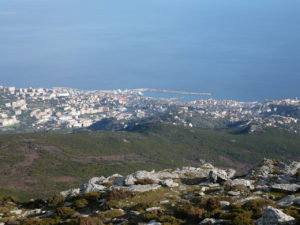
General Lazzarini was also responsible for setting up the Italian military cemetery in Bastia, which housed the remains of 531 soldiers, which were later transferred to Italy in 1964, and for checking and paying the damage reparations claimed by the French. Most war dead were returned to their families, while 211 of them were given their final resting place in the Lupi cemetery in Livorno, the city from which they had set sail for Corsica. They are still there today. The commemorative plaque focuses on the Friuli Division, which suffered the most arduous battles, and states: “To the fallen of the Friuli Division, who sacrificed their lives in Corsica in the autumn of 1943 to bring forth freedom”.
In remembrance of the events of the war, the city of Bastia later dedicated the city’s high school to the partisan Jean Nicoli, decapitated by carabinieri in August 1943. The school opened on the premises of the Marbeuf barracks, which had housed the local chapter of OVRA (Organisation for the Vigilance and Repression of Antifascism). The Battesti barracks in Ajaccio, the other branch of OVRA in Corsica, still exists and is used as a police station.
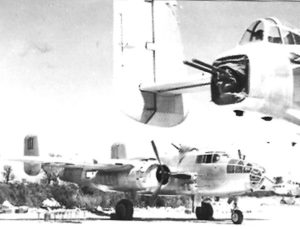
In allied hands, Corsica was quickly turned into an important air base. With 14 functioning airports, it became the jumping off point for several bombing missions to Italy, Yugoslavia, Austria and Southern France, all still occupied by the Germans by the end of 1943. The island was also an important strategic base for the allied landing in Provence in August 1944, launched after the attack on Normandy to win back the entire French territory.
The famous French writer Antoine de Saint-Exupéry, the author of The Little Prince, was one of the allied pilots based in Corsica. On the 31st July 1944 he took off from Bastia on a reconnaissance mission on board his Lockheed P-38 Lightning. It plummeted from the sky somewhere between Corsica and the French coast, leading to his death in the waters of the Mediterranean Sea. The circumstances of the incident remain shrouded in mystery to this day, although in 2003 Luftwaffe ace Horst Rippert claims he intercepted the plane and shot it down while flying his Messerschmitt Bf 109.
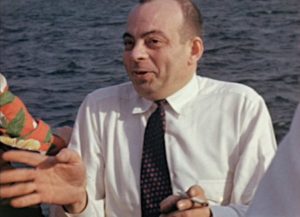
When evacuation operations ended in Corsica, the Italian occupation contingent merged with the contingent controlling Sardinia. In December 1943, then, almost 161,000 men found themselves stationed on the island. The Allies used this huge military resource for a dual purpose in 1944. Firstly, and most commonly, they were used as technical and logistical support for the British and American troops advancing up the peninsula. Secondly, they were used to form and reinforce co-belligerent Italian units fighting alongside the Allies on the frontline. Only a minority of soldiers, all with combat experience in Corsica, were deployed in war activities against the Germans.
My grandpa was one of those men. Not only, he was one of the first to be ferried to the mainland to join the war of liberation. He and the other bersaglieri of the XXXIII cyclist battalion were mobilised as early as February 1944. Between June and July it was the turn of the Friuli Division and the LXXI bersaglieri motorcycle battalion. Two months later the Cremona Division was also called up. All of these units, with the exception of my grandpa’s, reached the peninsula after the battle of Cassino and the breach of the Gustav line. He, however, made it in time to take part in that battle, which was one of the most agonising and iconic of the Second World War.
After the 8th September 1943 the pace of events in Italy began to accelerate.
First, the Italian resistance made some initial moves.
The National Liberation Committee (CLN, in its Italian initials) was founded in Rome on the 9th September, at a meeting attended by politicians of varying political persuasions: the independent Bonomi, the Christian Democrat Alcide De Gasperi, the Liberal Casati, the Socialist Pietro Nenni, the Communist Scoccimarro, and Ugo La Malfa from the Action Party. On that day they adopted a declaration that read: “The Anti-Fascist parties hereby found a National Liberation Committee to call Italians to the fight and the resistance to restore Italy to its rightful place among free nations”.
After the headquarters were established in Rome, local chapters sprang up. One in Milan, which in 1944 would become the Upper Italy National Liberation Committee, became operational as quickly as the 11th September 1943. It was followed by chapters in Florence, Turin, Genoa and Padua. Over time, more and more cities were added to this incipient network.
Broadly speaking, two types of resistance emerged.
In the South of Italy, the proximity of the Allies encouraged the population to take insurgent action against the Germans, who were under pressure from British and American attacks. The most famous of these, although not the only one, was the Four Days of Naples.
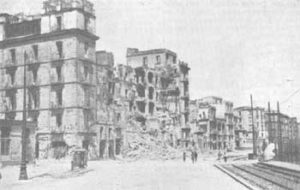
On the 22nd September, the Germans made an announcement, calling on residents of the city to report for work. It applied to all fit men between 18 and 33 years old, meaning a conscription of about 30,000 people. Only 150 responded to that call. The Germans decided they would use force instead and began to raid houses. On the night of the 27th September however, a few hundred people managed to steal weapons from some barracks, sparking an urban guerrilla that was probably uncoordinated but undoubtedly scrappy and dogged. For four days, the Germans were engaged in a battle they never imagined having to fight, until they were allowed to retreat in exchange for the liberation of 47 prisoners. On the 1st October 1943, Neapolitans handed the Allies a free city.
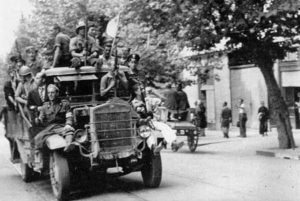
Unfortunately, however, the city’s tribulations did not end with the arrival of the British and Americans. Indeed, on the 7th October, the Post Office was hit by several explosions caused by time bombs hidden by the Germans before they cleared out. The toll was 30 dead and over 80 injured, all at a place and a time in which, in theory, the war was over. A sadistic, pointless vendetta.
Naples was then the clear indication that Italy had truly changed sides, and that for the Germans there would be no safe exit routes.
The resistance movement in northern Italy met with another sort of problem. The Germans, and with them the Salò Republic, maintained firm control over the area, and early hopes for a rapid end to the war in Italy evaporated quickly in the face of the German troops’ obstinate resistance. The partisans found themselves involved in a protracted, arduous fight, in the course of which the Germans did not hesitate to use terror tactics.
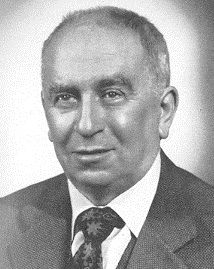
Further complicating matters, the partisans split into several factions based on their political ideology, often ending up competing against one another. Despite the difficulties of that time, people’s thoughts had already begun to turn to Italy’s future and, as a result, its possible political structure. Autonomous and declaredly non-ideological groups rapidly lost ground, while the Communists imposed themselves across all groupings thanks to their organisational capacities, extensive network and boldness. In November 1943, Luigi Longo, the future Secretary of the Italian Communist Party, set the tone when he wrote in La Nostra Lotta (Our Struggle): “We cannot and must not passively wait to be liberated by the British and Americans. The people will have its government only if it fights to achieve independence and freedom”.
The first few months were the most difficult for the partisans, from a logistical perspective, as they required time, supplies and constant contact with the Allies in order to organise effectively. Over the course of 1944 they shifted gear, becoming a constant thorn in the side of the German soldiers stationed in Italy, forcing them to divert units away from the frontline just to keep the territory under control.
In the meantime, the incipient Kingdom of the South, keen to gain legitimacy not only as a player in Italy’s future but also as a trusted partner to the Allies in their fight against the Germans, had to find a way to deliver their own declaration of war on Germany. It was an unavoidable formality, even though my grandpa and other Italian soldiers in Corsica were already fighting the Germans.
The problem, obviously, was to find a representative of the Third Reich in Brindisi. The Badoglio government planned what seemed to be a practical solution, and on the 12th October sent the following telegram to the Italian ambassador in Madrid: “Your Excellence is given the duty by His Majesty to communicate to the ambassador of Germany (…) that faced with continuous and intensifying acts of war committed by German armed forces against Italians, Italy considers that as of 3pm on the 13th October 1943 it is at war with Germany”.
The German ambassador in Madrid, however, having sensed the probable intentions of his Italian colleague, refused to receive him. On the 13th October, the ambassador therefore entrusted the declaration of war to one of his secretaries, who went to the German embassy in person and placed it in the hands of the first person he found at the entrance. His operation accomplished, he closed the door behind him and tried to vanish before he could be tracked down. The German bureaucrat however gave chase, caught up with him and forced the letter back into the Italian’s hands. It must have been a comic scene for anyone watching it on the streets of Madrid.
The secretary returned to the Italian embassy, head bowed, having to admit that he had not managed to complete the mission. But the ambassador found a way around it. Commenting on what had just happened, he declared: “If they rejected our note, they must have read the contents. It therefore follows, under international law, that we may consider the declaration of war successfully delivered”.
From that moment onwards, and thanks to that tactical move, Italy, although not formally recognised as an Ally, ceased to be treated as a defeated nation.
Immediately after the Italian position had been made official, on the 15th October, General Utili took control of the Italian Military Liaison Mission with Allied Forces, created in an attempt to improve relations with their former enemies and reach an agreement on sharing the war effort. Utili had served in both Greece and Russia, and after the fall of fascism on the 25th July he immediately suggested a war against Germany, before even negotiating the armistice. Things did not go his way, however, and it was hard for Italians to shrug off the reputation of being Hitler’s former allies.
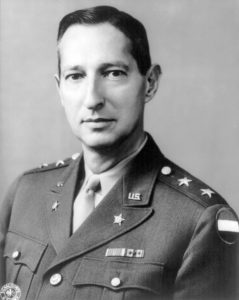
Utili turned out to be an excellent diplomat, as well as a good general. On the 20th October he was invited to attend the 5th American Army headquarters to hold discussions with its commander, General Clark, on the subject of including in the United States Army the First Motorised Combat Grouping, the first Italian unit to join the Allies in the war of liberation. Utili, in his memoirs, paints a very positive picture of Clark, who impressed him with his youthful figure and his cordial, energetic attitude. That meeting was the origin of the term ‘co-belligerence’, to describe the active role that the Italians would play, without officially being recognised as Allies.
The First Motorised Combat Grouping, privately nicknamed ‘Pedestrianised’ given the lack of available vehicles, was entrusted to General Dapino, who quickly realised that all allied eyes were on him. Eisenhower was indeed sceptical at the possibility and the wisdom of using Italians in combat, but he acquiesced to the insistence of Badoglio’s government. As Dapino pointed out, the Combat Grouping had ‘the grave responsibility to prove, with their actions on the battlefield, that our brutalised country deserved a better future”.
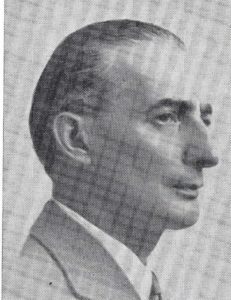
While the Allies debated Italy’s position, the Germans were rapidly turning the peninsula into a fortress, to be captured tooth and nail. Initially, Hitler, who feared further British and American landings behind the frontline, was sceptical about engaging the Allies for any length of time in that theatre. He therefore gave an order to his trusted General Rommel to prepare a defensive line only in northern Italy, protecting the mountain passes of the Alps. He changed his mind, however, when it became clear that the Allies had decided just to advance overland, moving up through the Apennines one metre at a time.
On the 21st November General Kesselring assumed command of all German troops in Italy, while Rommel was called on to organise the defence of France. On the subject of the Allies’ questionable strategic decisions, Kesselring himself noted: “One air landing in Rome and one naval landing in the area, rather than in Salerno, would have forced us to evacuate the entire southern half of Italy”.
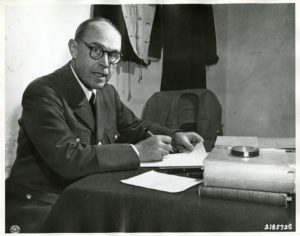
Kesselring also realised that the Allies’ actions were characterised by excessive optimism. Their confidence that they could quickly seal the deal in Italy made them predictable, which the Germans were able to amply and repeatedly exploit. On his ability to contain the British and Americans for some time, Kesselring wrote: “From beginning to end the Allies’ plans showed that the allied High Command’s main concern was with being certain of success, which led it to use conventional methods and means. For that reason it was almost always possible, in spite of insufficient resources (…) to predict their next move (…) and thus take effective countermeasures”.
Churchill indirectly agreed with him in a telegram to British Army High Command dated 19th December 1943, which read: “The total stagnation of operations on the Italian front is becoming scandalous. The fact that amphibious operations along the Adriatic and Tyrrhenian coasts were utterly neglected has had disastrous consequences”.
During that period, there were around 5.000 troops available to Dapino, all still equipped with Italian weapons. But they were lacking vehicles, uniforms, munitions and kit, including such simple items as cigarettes.
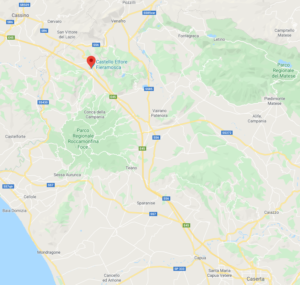
It was in those conditions, badly prepared and with their morale in pieces, that Italians first saw action in December 1943. The First Motorised Combat Grouping was given orders to capture Monte Lungo, which was preventing Allied forces from advancing to Cassino and overlooked Casilina, the artery connecting Rome to Caserta, close to the town of Mignano Monte Lungo.
The action was planned for a moment when forces in the field were finding a new equilibrium – some American units were demobilising in view of the future landings in Normandy, while Kesselring was receiving reinforcements from Hitler.
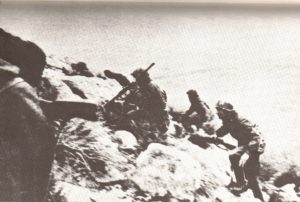
The assault on Monte Lungo was launched at dawn on the 8th December, just one day after the First Motorised Combat Grouping had arrived at the front. None of the soldiers had had time to become familiar with the terrain, and that morning the battlefield was covered in fog. After preliminary artillery bombing, which was entirely ineffective due to the low visibility, Dapino’s men started to climb towards their targets.
At the same time, the 36th Texas Division started out towards Monte Maggiore, situated to the left of Monte Lungo and higher than it. The plan was that the American units would cover the flank of the Combat Grouping as it advanced.
From the start, German resistance both on Monte Lungo and Monte Maggiore was more tenacious than expected. The Italians accumulated losses but held on, and after advancing for three hours, at 9:30am they reached the peak of Monte Lungo.
The mission appeared to have been accomplished, but in that very moment the situation began to degenerate.
The sun rose higher in the sky, the fog lifted and Dapino’s men suddenly found themselves facing a series of fortified German positions. Some of these peered out from inside the caves on the mountain side. Black holes spitting furious fire.
Taken by surprise and by now extremely visible in the light of day, the Italian soldiers were mowed down by a combination of mortar, artillery and machine gun fire.
Meanwhile, the Texas Division had been pushed back and had relinquished its attempt to take Monte Maggiore. The Germans still occupying it therefore turned their weapons on the Italians pinned to the sunlit peak of Monte Lungo, and opened fire.
It was a massacre. At 10am, when it became clear that there was nothing to be done, a desperate order to retreat was issued. Soldiers began to run back towards their initial positions, reaching them only after they had lost 300 men (47 dead, 102 injured and 151 dispersed).
The first contact with the enemy had been traumatic, but the Allied advance could not wait.
A second attempt to take Monte Lungo, which by this point had become a dystopian landscape of razed trees and churned earth, was organised for the morning of the 16th December. This time, the attack was better planned, and the assault was only launched after Monte Maggiore on the left had been captured, and effective artillery fire. By 1:30pm on the same day, all targets had been reached and the men of the Combat Grouping could claim their first victory, for which 10 more men had paid their lives and 30 had been injured.
It was a high price, and the Americans realised it.
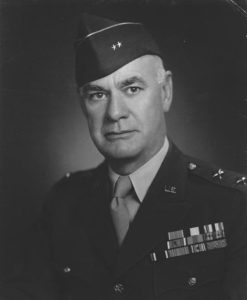
General Walker, the commander of the 36th Texas Division, wrote to Dapino following the action: “I have heard from several sources about your troops’ excellent behaviour when launching their attack on Monte Lungo. Please extend my congratulations to your officers and soldiers for their enthusiasm, spirit and incredible courage”.
General Clark, the commander of the American troops in Italy, sent the following telegram to Italian command: “I wish to congratulate the officers and soldiers under your command for their success (…). This action shows Italian soldiers’ determination to liberate their country from German control, a determination that should serve as an example to the oppressed peoples of Europe”.
Monte Lungo was a bitter baptism of fire for the reconstituted Italian army and marked the beginning of co-belligerence alongside the Allies. The bloody sacrifice was extreme, however, and the Combat Grouping was sent to the rear guard to rest and reorganise after only two weeks at the front.
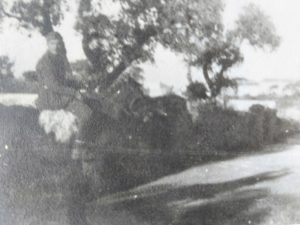
While all of this was happening, my grandpa and his men were languishing in Sardinia, feeling abandoned after the clashes in Corsica. Over the days following the evacuation, it seemed that no one had any clear plans for their future, and the feeling of having been forgotten by all quickly swept through the ranks.
To make matters worse, illness and hunger came hot on its heels. My grandpa was struck down by a bothersome inflammation of the face, probably brought on by the precarious sanitary conditions and the stress of the previous weeks. He was forced to stop shaving, as well as to rest his body and mind in an attempt to recover as quickly as possible.
This was no easy task, given the chronic lack of food in Sardinia. There were too many soldiers to feed on the island, and almost none of them had access to sufficient rations or even simple bathing facilities or a clean uniform. My grandpa’s entire universe was reduced to his digestive system, and he felt his humanity being slowly gnawed away. He was shocked to think that there was a time when world events concerned him or occupied his attention. Now all that mattered was not to go to bed too hungry.
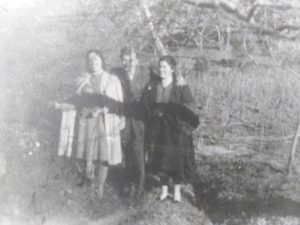
Luckily his orderly, Borghi, stayed loyally at his side, becoming a source of great courage as the days unravelled around them. Their obstinate resistance was rewarded by fate. Having taken shelter with their unit in the village of Calangianus, around sixty kilometres to the south of Santa Teresa di Gallura, my grandpa was taken in by a local family who shared the little that they had to feed him and help him to recover, without asking for anything in return. A small miracle of humanity in the chaos that surrounded them.
When that happened and my grandpa could once again think straight, he was overcome with longing for Ginetta, whom he had not seen for over a year by that point. The memory of her filled him to the brim, so much so that he almost felt it jumping out of his heart. To avoid the thought, he was tempted just to let it go. He would be lonelier, but freer. He would not feel that he was wishing his life away.
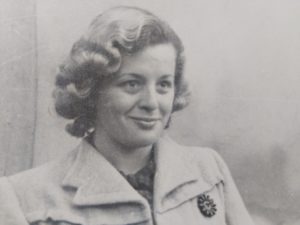
One evening, while he was crying over his doubts and his loneliness, hidden from view, Borghi found him and sat down next to him. “If you were truly alone, that would mean that you don’t matter to anyone. Well, me and the others, we need you. Ginetta too” he said, smiling. Those words, and the hand he rested on his shoulder, were enough for my grandpa to find meaning in things again. It was exactly what he needed in that moment.
After the ordeal in Monte Lungo, the men in the Combat Grouping spent a morose Christmas. General Dapino became the inevitable scapegoat for the high number of lives lost. Whether he truly was responsible, or whether he was just a victim of circumstance, mattered little: on the 8th January 1944 General Utili received the order to replace him at the head of the Combat Grouping.
When he took over the Grouping, Utili immediately began to reinforce its structure. The first step was to recruit two key men: Lieutenant Colonel Lombardi, appointed as the new Chief of Staff, and Colonel Fucci, who had effectively led the 10th Light Grouping in Corsica, where my grandpa served, and who was recalled from Sardinia to take up the role of Deputy Commander of the Grouping.
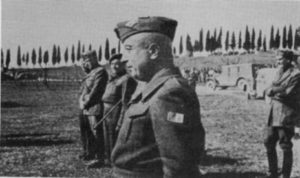
Later, Utili met his men in the presence of General Messe, Chief of Staff for the Italian Co-belligerent Army. Introducing him to the troops of the Grouping, the latter declared, not without emotion: “I am entrusting you to a man who will be stingy with your blood. He will spend it when necessary, but never in vain and never lightly”.
Immediately afterwards, on the 24th January, Utili travelled to Caserta to meet with General Clark once again. It was a decisive encounter: indeed, he had to obtain promises to improve supplies to the Combat Grouping and guarantee that they would return to the frontline as an autonomous, recognisable Italian formation.
Utili put forward his point of view, the forces available to him and the moral and historical importance of having a clearly identifiable Italian unit among the Allies, rather than diluted among the British and American units, as some were still suggesting, in spite of the evidence of Monte Lungo. At the end of the conversation, Clark looked at him and said: “General, I understand you and I appreciate your presentation. Your soldiers will fight with us and I am certain that they will fight well. I will give orders for your requests to be fulfilled”.
Buoyed by this confirmation, Utili felt ready to take his men back to the frontline, confident that they would be fighting only under his command.
The timing could not have been better, as precisely at that time the Battle of Cassino was beginning, which was in reality a series of four long battles, fought between January and May of 1944. It took that many battles to force the Germans back from the so-called Gustav line, a chain of strong fortifications that cut across the Italian peninsula at its narrowest point, from the mouth of the Garigliano river in the west to Ortona, south of Pescara, in the east. In the final months of 1943 the Germans had repeatedly reinforced the line, taking advantage of the natural barrier of the Apennines and turning it into a labyrinth of bunkers, trenches, minefields and barbed wire. The town of Cassino, which was the access point for the Casilina road across the Liri Valley and therefore Rome, was the linchpin of this defensive system.
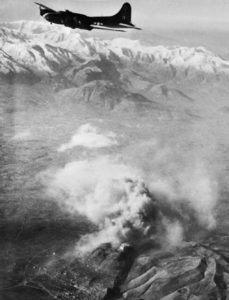
The first two battles were fought over January and February. The Allies had gathered troops from around the world, but in spite of repeated attacks by the French, Americans, New Zealanders and Indians, the Germans managed to hold out, inflicting cruel losses. Before one of those conflicts, on 15th February 1944, Montecassino Abbey, a Benedictine monastery overlooking the town of Cassino, was heavily bombed by 256 allied aircraft, as it had been wrongly suspected of being an observation and defence point for the German army. The only achievement of the operation was to kill several civilians who were sheltering there and to reduce the building to rubble, later occupied by the Germans and turned into a massive defensive bulwark.
The Combat Grouping reached its frontline position on the 8th February 1944, having been placed within the CEF, the French expedition corps in Italy. Worried that previous hostilities could cause tension among the soldiers, on the 5th February Utili met with both General Juin, CEF Commander, and General Guillaume, Commander of the French colonial troops, in Venafro. He was welcomed warmly and General Guillaume in particular, who was married to an Italian woman, did all he could to improve Italo-French relations and ensure that the Grouping could fight effectively. In a private interview, to clarify that the French contingent bore no grudges, he reassured Utili, saying: “We military men must obey, heaven knows where politics will take us”.
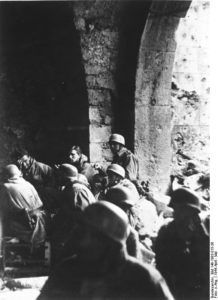
The section of the line given to the Italians was to the right of Cassino, north of the road connecting Isernia to Atina, and was the link between the French contingent on the left and the Polish on the right. The Grouping was sent to a mountainous area, which benefitted from the Colli-Venafro supply road. The Italian troops occupied a plateau between six and eight hundred metres above sea level, with the Volturno river on its right flank and Monte Marrone on its left. The villages of Castel San Vincenzo on the right, approaching the source of the Volturno, and those of Castelnuovo a Volturno and Scapoli in the middle were in Italian hands. Castelnuovo had been completely destroyed and was uninhabitable, while Scapoli was an excellent viewpoint from which to observe the front. Utili set up his headquarters there, in Marquis Battiloro’s house, whose roof had previously collapsed under artillery fire. In the towns and countryside all around, sanitary conditions were extremely precarious.
On the other side of the line, the Germans had the benefit of occupying the high rocky land overlooking the front. They had taken up positions on Monte San Michele on the right, in whose southern wall the medieval hermitage of San Michele a Foce is nestled, as well as on Monte Marrone, and behind that, Monte Mara, to the left. All of these peaks were excellent positions for German artillery, mortars and machine guns. When the Italians moved too visibly along the frontline, they were immediately targeted by enemy fire. The first lesson they learned was to keep their heads down, especially during the day.
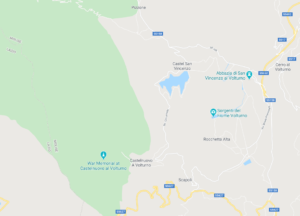
While he coordinated the Combat Grouping’s arrival on the front line, Utili also pushed to receive the Italian troops stationed in Sardinia who had fought in Corsica. Those veterans with combat experience were exactly the type of soldiers he needed. My grandpa and the men of the XXXIII bersaglieri cyclist battalion were therefore the first to board. On the 9th February 1944 three cruisers picked them up in Cagliari and deposited them the next day in Naples, where they arrived dirty, malnourished and swaying. The break that had placed them outside of space and time in Sardinia was finally over: more than a year after his departure for Corsica, my grandpa was finally back on the Italian peninsula.
Stepping off the boat in Naples, the sea air entered his lungs and met a tangled knot of emotions. Fear for what awaited him. Melancholy at the thought of who he had been before the war. The hope that this would all be over quickly. Impatience to see Ginetta and his family again. But above all, I believe, was his happiness to be closer to home again.
In my life I have been lucky enough to travel widely. But I remember one journey back to Italy particularly vividly, on the 8th October 2003, after a week spent in Israel and Palestine.
I was 22 years old and I was returning from my first work trip. The aim of the trip was to contribute to a UN project to rebuild the Bethlehem Chamber of Commerce. At the time, none of my colleagues wanted to travel to that part of the world – indeed, it was the time of the second Intifada, Arafat was under siege in his headquarters in Ramallah, the Israel West Bank wall had been under construction since a few months and Palestinian attacks, as well as Israeli reprisals, were a daily occurrence. I had accepted the offer to go there with a mix of trepidation and curiosity. It seemed like a worthy project. Moreover, I was excited at the idea of putting myself to the test in that way, as well as at the opportunity to see places that may otherwise have been inaccessible to me, at least at that time, as a mere tourist. I thought about my grandpa then and it calmed me: if he had survived considerably worse circumstances, at 22 years old, there was no reason for me to be scared.
I took off from Milan at dawn, and as soon as I landed in Tel Aviv I was taken to the Italian consulate in Jerusalem. There I met part of the diplomatic corps and a team of carabinieri bodyguards, all veterans of peacekeeping missions in Somalia and former Yugoslavia. They shook my hand with a smile, but their physiques were fairly imposing and they all looked like they struggled to fit the clothes they were wearing. One of them told me he had been attacked several times, and had had to respond with gunfire, while he was escorting humanitarian caravans in Africa. I wasn’t sure whether their presence reassured me or worried me.
After the introductions, one of them took me to Bethlehem in a car painted all over with Italian flags. To get to our destination, we had to cross the border between Israel and the West Bank, passing through the Israeli checkpoint and then the Palestinian one. The latter was a formality: two men sitting behind a barrel with Kalashnikovs strapped to their chests, who waved us through when they saw the Italian flag.
The first checkpoint was a different experience. We were forced to drive through a sort of barbed wire slalom course, with reinforced concrete obstacles. Once we made it through the course, we stopped in front of a team of soldiers armed to the teeth. At least two of them were pointing their weapons directly at our car’s windshield: one was standing next to it, looking through the viewfinder of his rifle. Another was sitting behind a heavy machine gun, which sat on a raised structure overlooking the whole checkpoint. I wasn’t in any immediate danger, but I still had the unpleasant feeling that my life lay in the trigger finger of a couple of strangers.
“Put your hands where they can see them on the dashboard and don’t do anything they don’t tell you to” said the carabiniere driving the car. I nodded, and together we waited for two more soldiers to approach the car, one to check the platform with a mirror, and the other to ask for our documents. I continued to watch my escort out of the corner of my eye, trying to understand if everything was going according to plan. Once we had made it through the ordeal, he dropped me at the entrance to a totally empty hotel in the middle of a ghost town. Bethlehem, which was usually a pilgrimage and tourist town, seemed completely abandoned – in the silence of the evening the only movement in the streets were the eddies of dust.
Over the course of those days, after the meetings, I met several Palestinian families, some of whom were crammed into rooms that emanated the desperation of extreme poverty. As I travelled around, I suddenly saw an Israeli settlement on the horizon, on the outskirts of Bethlehem, like a castle built on an isolated hillside. In an effort to make me feel welcome, my hosts took me out for dinner, in a restaurant whose walls had been riddled with gunfire in a recent Israeli attack. Among the bullet holes hung the photo of a little girl who had been killed in the assault. I tried not to look too upset, and towards the end of the meal some of the younger Chamber of Commerce employees asked me how they could leave their country to study in Europe. One of them handed me his CV, smiling, mistaking me for someone who could have any influence over his destiny. I didn’t know what to say to him.
Having spent three nights in Bethlehem, I was transferred to Jerusalem, as the guest of one of the consulate workers. My accommodation was a sort of bunker, a place in which to take shelter in case of an incident outside. The door was reinforced and light entered only through a miniscule window that closed with a thick metal plate. It was a claustrophobic space, and I managed to get to sleep only as the first light of dawn filtered into the apartment, finding me exhausted.
On the day I arrived in Jerusalem, Saturday 4th October, the restaurant Maxim in Haifa was blown up in a suicide attack. 21 people were killed and 51 were injured. The assailant was 28 years old and was called Hanadi Jaradat. She was a Law student, whose boyfriend, brother and cousin had been killed by the Israeli army over the years. I felt like I was witnessing the obscene birth of a violence turned inwards on itself.
The following day, in response, four Israeli F-16s hit a Palestinian training ground north of Damascus, thus attacking their first Syrian target since the Yom Kippur War in 1973.
I spent the next few days in Jerusalem crossing the city in a constant state of alert, keenly aware that every bus, market or public place could be the target for another attack. The consulate workers discussed events with bated breath. Some feared that the Israeli actions meant the conflict would spill out across the rest of the region, others that the airspace would be closed. I remember the quite logical desire to leave as soon as possible, but also the intense, almost ferocious joy at feeling the night sweep over me after a day without incident. Life, in that place, was a drug that you could easily get hooked on, and I was afraid of it.
At last, the time came to leave. After three hours of thorough searches and detailed interrogations at Tel Aviv airport, I was escorted to the plane by an Israeli guard and I was back in Italy by night time.
When I got home, I hurried to share my experiences with my grandpa, to whom I had mentioned nothing until then so as not to worry him. I told him about what I had seen, and the tensions of those times. Talking to him, I sought his approval, as well as some way to connect with what he had lived through at my age.
I didn’t get that far, but I still caught a flash of admiration in his eyes. “You were right not to tell me when you left. I’m happy you’re back” he said, before giving me a hug.
When I needed a crumb of extra courage during my trip, I reminded myself that life is what it is, it doesn’t always let us decide on our own circumstances. But we are free to decide how to deal with them.
I didn’t tell him that I had inherited that idea from his experiences, and he said nothing more. As I said goodbye though, I still hoped that he had understood.
After they arrived in Naples, my grandpa and the other bersaglieri were transported to Monteroduni, a village clinging to a hillside overlooked by an 8th century citadel. With its rectangular plan and a tower on each corner, it looked like the stereotypical medieval castle that a child would draw as they imagined themselves to be a knight.
The village was close to the front, and the men of the XXXIII bersaglieri battalion arrived on the 14th February. Utili and Fucci went to meet them personally, and when the soldiers saw the man who had led them in battle a few months earlier in Corsica, a wave of emotion swept through their ranks. There were several moving embraces, following which the bersaglieri received another surprise. A generous shipment of allied food rations was distributed, and the soldiers didn’t wait to tear through them. They were all in desperate need of a hot bath, new uniforms and more substantial food. Some, in jest, said that in those conditions war may even become pleasant. I remember that even my grandpa had said so, with a smile – that arriving at the allied camp, with its abundance of food, medicine and kit, seemed to him like going on holiday.
He and his men would have a chance to rest and recover from the struggles of the previous months. But it was a short break. Everything was ready for the final assault on the Gustav line.